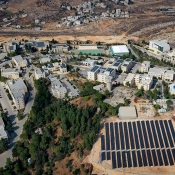International Women's Day in Science: female role models from Birzeit University
The world celebrates the International Day of Women and Girls in Science on the eleventh of February of each year. The international day, adopted by the UN General Assembly in its 70th session in 2015, aims to affirm the role and contributions of women in the various scientific fields and disciplines, and the importance of such efforts in developing numerous scientific areas.
This year’s celebration affirms that the world needs women to achieve development and sustainable development, out of the belief that gender equality in science is crucial to achieving the internationally-adopted sustainable development goals, including the 2030 UN Agenda for Sustainable Development.
Birzeit University, out of its belief in the vital role of women in all aspects of life, has played a major role in engaging women (students and faculty members) in science. One needs only to look at the great impact of female role models in science at Birzeit University for proof of that. Below are some of Birzeit University’s female luminaries in science:
Nadia Habash
Nadia Habash rose among the ranks of architectural engineers to become one of the foremost local authorities in the restoration of historic and heritage sites. Habash is also one of the founders of the Department of Architectural Engineering in the Faculty of Engineering and Technology at Birzeit University and a professor of architectural engineering.
Habash is the recipient of many awards for her contributions in construction and architecture projects, the latest of which was the Hassib Sabbagh and Said Khoury Engineering Award for the best project in Architecture Restoration category. Her winning project, “Restoring Araba Palaces,” managed to preserve architectural heritage while repurposing it to serve a better social role.
An assistant professor in the Department of Physics, Dr. Wafaa Khater earned her bachelor’s degree in physics from Birzeit University (1998), her master’s degree in particle physics and high-energy particle accelerators from the Institute of Physics and Technology at the University of Bergen (1999), and her Ph.D. in particle physics and high-energy particle accelerators also from the University of Bergen (2003). She is also a fellow of the International Center for Theoretical Physics (ICTP), based in Trieste, Italy.
Wafaa Khater
Dr. Khater’s research interests include particle physics and high-energy particle accelerators, as well as computational and mathematical physics. Apart from her academic pursuits, Dr. Khater is also interested in women and physics in developing societies, the spread of scientific knowledge in society, and electronic and mobile education.
Dr. Khater is proud of Birzeit University’s female students and faculty members who continue to set academic benchmarks for others to follow and lead nationally and locally. “Seeing more and more female faces among the faculty members makes me very optimistic about the future; it marks the emergence of a new generation of female physicists. I hope that talented female physics students find opportunities to pursue higher education in prominent institutions and then go on to lead illustrious careers in physics and research,” she said.
Sanade Barakat
Sanade Barakat is a brilliant teaching and research assistant in the Department of Biology and Biochemistry. She earned her bachelor’s degree in biology from Birzeit University, and she is currently pursuing a master’s degree in environmental biology at Birzeit as well.
Barakat is the department’s longest-serving teaching assistant. As such, she had the opportunity to take part in a number of exciting and vital research efforts. “I participated in the department’s research efforts and published my first article in Springer, in 2013, titled ‘RAPD Assessment of In Vivo-Induced Genotoxicity of Raw and Treated Wastewater to Albino Rats.’ I have also worked with an inspirational professor of mine, Professor Khaled Swaileh, on a study where we observed whether treated wastewater used for irrigation purposes affects the genes of animals,” Barakat said.
“I have also worked with Dr. Ahed Bahader and Dr. Mahmoud Srour on another research project which assesses the occurrence of a gene in local cows that stimulates the production of a potentially harmful protein in milk found associated with many diseases. And I’m just about finishing up my thesis which focuses on screening for a fungal toxin called aflatoxin in food items marketed in Palestinian markets and means of remediation from this toxin.”
Juaman Sa’d, Tasneem Jamjoum, and Du’a Assaf
Three Computer Science majors from Birzeit University - Juaman Sa’d, Tasneem Jamjoum, and Du’a Assaf - designed and developed a video game that simulates life in the Old City of Jerusalem. The video game displays, in a remarkably realistic fashion, the mores and praxis of the city and the Arab heritage of the food, desserts, and traditional fashion displayed therein.
The video game, called “Heaven’s Gate,” was designed by the students as their end-of-studies capstone project, and was supervised by Professor of Computer Science and Chair of the Department of Computer Science Dr. Mamoun Nawahdah.
The three-dimensional, interactive video game gives players the chance to roam the streets of the Old City and highlights Israeli violations against inhabitants of the city.
“We created the game to showcase Jerusalem as Palestine’s capital and one of the holiest cities in the world. Our dream is for ‘Heaven’s Gate’ to be the first interactive title that presents Jerusalem to tourists and those who can’t make it to the city,” said Sa’d.
Alaa’ Badwan, Ayah Jarrar, and Safa Jabrini
Alaa’ Badwan, Ayah Jarrar, and Safa Jabrini, three doctor of pharmacy majors at Birzeit University, claimed the second spot in the university’s entrepreneurial initiative, which aims to support entrepreneurial projects that serve and benefit Palestinian society.
The team was awarded $25,000 to establish a startup to develop their application, “Pharmacists Everywhere,” which provides users with pharmaceutical services that facilitate access to proper, suitable medication. The application also offers services to review the user’s drug plan and provides consultations on medicine.






